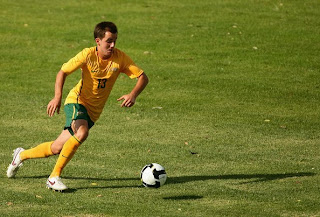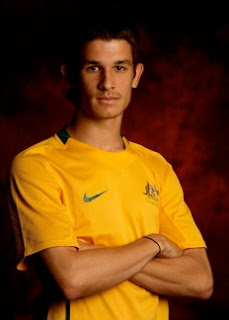Steven LušticaIn a recent article published in the Sydney Morning Herald, it has been discovered that the Hrvatski Nogometni Savez (HNS) has taken an interest in the services of rising A-League National Youth League star and Canberra native Steven Luštica. Fellow Australian born Croat and former Manchester United goalkeeper Mark Bosnich has taken shots at the HNS for the interest in the youngster, accusing the organization of once again poaching Australian born talent:
‘It’s not a problem to be proud of your heritage,” Bosnich told The Sun-Herald. ”But if you’re born here and the Australian Institute of Sport [or similar academies] have paid for your footballing education, then it’s simple – Australia should be your country of choice, your first priority. There should be compensation if you represent another nation.” -Mark Bosnich
Croatia has a rather large diaspora residing outside its national boundaries today, and this is reflected in the makeup of the national team. Players born in Bosnia-Herzegovina, Germany, Switzerland, and Australia to parents of Croatian bloodlines choose to play for Croatia to honor their heritage and ethnic homeland, an option that previous generations did not have because their ethnic homeland was under the banner of Yugoslavia. Despite the great honor of playing for the country of your ethnic heritage, the domestic soccer federations of these Croats born in the diaspora have made profound accusations of player poaching against the HNS, and no organization has been more critical and outspoken on this matter than the Football Federation Australia (FFA).
Australia, home to nearly 120,000 people who identify themselves as having Croatian ancestry today, had long been a country proud of its athletic accomplishments in cricket, Aussie Rules, Rugby League and Union before the influx of European immigrants in the fifties, sixties, and seventies brought their traditions of soccer to their new homeland. Among those immigrants, Croatians brought their style of play over to the continent, establishing new teams for amateur leagues throughout the country and quickly rising to success.
Fast forward to today: Croatian-Australians have become a pivotal part of the make-up and success of soccer Down Under. The 2006 Australian World Cup squad alone featured 7 players of Croatian bloodlines alone. However, on the other side of the ball, the 2006 World Cup squad of Croatia featured 3 players of Croatian bloodlines born in Australia but chose to suit up for the Vatreni.
Osijek-Born Dario Vidosić
Joey Didulica, Anthony Sertić, and the most successful of the three, Melbourne’s Josip Šimunić were all born, raised, and began their careers in Australia, with the latter two honing their skills at the tax-payer funded Australian Institute of Sport as teenagers. The FFA has used this argument to justify its attack on the HNS’s courting of Australian-born Croatian players. In some more recent cases, Croatian-Australians Matthew Špiranović, and Dario Vidosić both spurred advances by the HNS to wear the red and white checkers of the Vatreni, opting instead for the green and gold of the Socceroos (Vidosić was actually born in Osijek).
Matthew Špiranović opted to suit up for the Socceroos
What Bosnich and the FFA fail to note is that all of these players are in fact eligible to play for Croatia through their parents and/or through dual citizenship (which Australia recognizes, trust me on this one). How can it be considered poaching if the player is technically eligible to play for that other country? Remember, multiple generations of Croatians may have excelled at the sport, but did not have a Croatian NT to represent. It could very well be the wish of a player himself to honor those who didn’t have this privilege by wearing the red and white checkers as opposed to the colors of his birth country. The first generation of a diaspora, regardless of ethnicity, will always feel a connection to the birth country of their parents and its culture. The AIS and other large sports institutes need to take that into account when deciding whether or not to invest the time and money into a player: the calling of the homeland may draw that player back, regardless of the taxpayer dollars invested into his development.
Josip Šimunić and fellow Australian-Croat Mark Viduka
Personally, I do not have a problem with a player of Croatian ethnicity born into diaspora suiting up for the Vatreni if presented the opportunity. However, the decision should be one made entirely with the heart, and not for contractual reasons or to better ones status on the transfer market (let’s not forget the case of Darío Cvitanich). The player should be well-connected with his roots and culture and have a firm understanding of what it means to put on that jersey and who and what he is representing when wearing it, past and present.
”I’m very proud of my Croatia heritage, but for now I’m playing for Australia and that’s what I want to keep on doing for now,” Luštica said.
At just 19, Steven Luštica may have to make a very important decision in the not-too-distant future. Currently, he is competing with the Australian U-20 squad as well as Gold Coast United Youth Squad. However, in the end, it is his OWN decision to make regarding which country he will represent at the senior level.
~Ivica Peroš, back in action, reporting from Long Island, New York







The ultimate decision lies 100% with Lustica himself. If he decides to play for Croatia then great, because he will most probably be playing with an extra drive when putting on that magnificent checkered shirt. The cheap article in the Morning Herald talking about Australian tax payers' money….maybe Australia should be paying an annual fee to Croatia for getting all that talent and for Croats, Greeks and others actually building the Aussie National squad from scratch. Australia has gained so much more from Croatia than the other way around. Nuff said.
Bosko Balaban? Sorry but you lost me there. Who else was he going to play for. I'm can't see how that has anything to do with money. Balaban did his best for Croatia, but he's just not all that good. In fact he did alright for us. He never played a pick game for Croatia so we can't exactly criticise him. WC 02 – never played, Euro 2004 – never played. WC 06 – never played. I don't see it myself. He played against a lot of little sides and to be honest he didn't alright V Iceland, Latvia, San Marino, Andorra, Belgium. Bravo to him for that, but we all know he couldn't handle the big teams, big leagues and that's fair enough, but i wouldn't personally criticise his performance for national team as he never played any significant match.
Some people with their comments hare have spoken about the AIS as though it’s this magnificent sporting institute that produces amazing players. Well let me tell you tat is certainly not the case. The fact is the AIS miss the mark so many time in actually brining in young talented players into their system. There have been many players that never got a look in from the AIS that went on to forge successful careers while those who gained the AIS scholarship faded into obscurity. There was a time when the AIS was indeed held in high esteem, but those days are well and truly over. Particularly in the past decade the AIS has become a joke in Australian soccer
And when it comes to developing Croatian players in Australia their development 99% of time comes from within the Croatian community itself through Croatian backed clubs. Clear example is Josip Simunic played almost his entire junior and youth football at Canberra Croatia. In his late teens he spent a few years at the AIS before being snapped up by the Melbourne Croatia (Knights) where he began his senior football career, spending two seasons at the club playing in Australia National Soccer League. He slotted right into our first eleven at 17 years old. After that successful stint he was transferred from Melbourne Croatia to Hamburg in the Bundesliga. And this is just one of many examples.
There have been a total of 45 players of Croatian heritage that have played for the Australian national team, and most have similar stories to Simunic. The Croatian community in Australia has for over 50 years been working its arse of giving young kids the opportunities to forge careers in soccer. For me the argument that it was ‘tax payer funded money that produced a player’ is utter garbage
JP wins Scholar of the Month with that line…
"…is the AIS developing the players or are the Croatian kids developing the AIS?"
I couldn't agree with you more Ivica. We can debate on that for hours. Maybe we can get a hold of Bosnich for an interview. A little CSR Hardball. Anyone have direct contact?
"…is the AIS developing the players or are the Croatian kids developing the AIS?"
Wow JP, that is some question my friend…I never once thought of that while writing this article.
Ante K, you hit too many major points on your 2nd to last post…too many good one to address individually, but each sentence was clear, concise, and to the point.
Now that I think of it, there really isn't any other nation that comes to mind regarding its diaspora combing back to represent it from countries with complete resources.
@ Ziva,
There's always an exception to the rule.
But look at how the HNS played Mandzukic and Kalinic. They were absolutely not ready to play senior international soccer but Markovic, Bilic and Co. put them on the squad.
I'm not going to talk your ear off about this as you already know that situation, but it's all for exposure and transfer cash. Kalinic ends up in England. Now let's see where Mandza ends up.
Again, this is not the players' faults, but Balaban had the option of playing for Croatia and took it. He had nothing else going on. We would all put on the shirt at the point, regardless of motive.
@ante…..I agree with almost everything you posted, with the exception of playing for country because of heart and not money. For the most part that is true, but we have had a few guys that cared more about the national team because of what they could earn from being a national team player.
Balaban comes to mind and a few others.
Wah wah Bosnich!
He obviously has personal issues over his decision.
That or he's working on a political career in Oz. Who cares. Develop them or don't. This begs the question…is the AIS developing the players or are the Croatian kids developing the AIS?
Aussie's of all stripes still have the right to leave the country don't they?
Lets get an interview with Lustica happening!
Ahh, and as for the doctors. I know most doctors leave poor areas to go learn in first world countries so they can return educated. However, doctor is an occupation. If you pay someone enough money they will do anything and work for anyone.
All soccer players have club teams they can play for, but only one international team. It's not for money and it's not fame. It's for pride of country. That's why the doctor argument is different from international ball.
@ Tom,
Fantastic question.
I think Croatia is the one nation on this planet that a player will want to play for even though they were raised in a nation with complete resources. e.g Switzerland, Australia, Germany.
I believe this is so for 2 reasons.
1. As kids growing up in a Croatian household, no matter where in the world, we are instilled rich Croatian pride and culture. We're aware of it from day 1. It's hard to turn that down when you actually get a chance to put on the checkers for real.
2. Croatia's Golden Generation with Suker in the 90's plus the 3rd place finish in 98 puts us on the world soccer map forever. As soon as Croatia got a chance to shine on the world stage, they did. And that brings tradition to the federation immediately.
Why do players want to play for Real Madrid, Barcelona, Manchester United, AC Milan? Tradition. They want to be part of that legacy.
Croatia is the underdog that always had the most realistic shot of doing damage at every tournament. The fans are always 100% behind them, How would Rakitic or Simunic feel if they won titles with Switzerland or Australia? Probably not even 5% of what they would if they won it with Croatia. In the end, you can't sell out the way you were raised and the feelings you feel.
Concerning parody, if you grow up in England, Brazil, Argentina, Italy, France etc, you will end up playing for those countries. I don't see any of these French-Africans returning to Africa to represent the country of their parents like Croatians do.
The Kovac brothers were never in the German system internationally. They were in Croatia much of the year and knew they were going to play for Croatia and only Croatia. This is not a case of poaching. Sure they were born and lived in Germany, but I don't think this is a diaspora argument.
If you live in another nation and speak the Croatian language, you're Croatian and have the right to be drafter by the HNS. Croatian isn't exactly a language you learn in high school or college a must known. It's a cultural language. That's why Gregory Sertic and Dario Cvitanich are not allowed on the team IMO. How can you play for a national team when you don't even speak the language? That should be the first criteria.
I'm babbling now, need to regroup my thoughts….
Without the diaspora the national team would be shit. No way we would have qualified for any tourny since 2002 without the foriegn legion. The diaspora has covered up the lack of development in Croatia.
As for Dad Prso….he is bron in Cro, but finally developed his game in France.
As for Seric….it was a business decision he made along with his father. Ciro offered Seric a roster spot and in return Ciro received money both from Seric's old man and from hajduk.
Seric's was a terrible decision. he could have clocked up so many caps playing for Australia. For Croatia he is not remembered for anything. Basically we never saw him. He never once got a run in the team. Sometimes it was poor coaching decisions, but to be honest when you consider that Igor Tomasic suited up for Bulgaria, Ivica Vastic for Austria and Branko Strupar turned out for Belgium and nobody complained then nobody would have had any issue is Seric played for Australia. Worse decision he must have made in his life was choosing Croatia.
From a career point of view Simunic, Rakitic, Petric, Klasnic, Kovac's, Eduardo was all the right decision for both parties. It'd be great if Gavranovic also chooses Croatia, though i think if you've already turned out for Swiss under 21 team Swiss are gonna feel slightly used when he plays for Croatia which it appears is his intention.
Ante, you said…
"But with poaching comes no parody in world football. If the best dual citizenship players jeep going to the top 20 ranked countries in the world, how can teams get better?"
Let me turn your question around. Could Croatia compete if it didn't supplement its roster with players raised in other countries?
Recent experience suggests it could not, e.g. the Kovac brothers, Simunic, Raketic,… (Can we include Dado Prso in this group too?) So, I would argue "poaching" in fact promotes parity rather than works against it.
Incidentally, I thought that was an excellent point the anonymous contributor made about doctors and other professionals. The developing worlds gets screwed by the advanced nations in the world, losing their best and brightest citizens all the time.
Why is nobody questioning all the big and mighty in the world (USA, Canada, etc.) for taking many of doctors, engineers and other highly educated people from small countries that put a lot of their resources into their school system only to loose the graduates to a “better world”? Who cares about morals or ethics in the business world anymore?
First off, fantastic article Ivica!
It's a tricky situation when taxpayer money is involved. Australia definitely has a case because they are raising these kids with there own resources. If these players did not have the financial advantages that Australia offered them, they would be no good for Croatia or any kind of international competition in the future anyways.
However, who's to say which country a kid can play for? If I had to pick between the U.S. or Croatia, it's a no-brainer…checkers it is. Is a 17 year-old kid too young to pick a country for the rest of their life? Is it morally wrong to leave a system that raised you for a culture you only get to experience in the prime months of summer?
My answer to all this: FIFA instates a law that says once a player steps on the pitch as an U-21, he is that country's property for life. This ensures no poaching. If you want to get into a country's system, do it early. At the age of 16,17.
Prime example: Villareal's Giuseppe Rossi. Born in New Jersey but started representing Italy at U-16 level. Nothing wrong with that. Never in the American system.
Look at Rakitic. Switzerland got F'd on that deal. Croatia waited until he was ready to leave the crib and made the phone call. In business terms this is horrible. As a Croatian fan I obviously do not object.
But with poaching comes no parody in world football. If the best dual citizenship players jeep going to the top 20 ranked countries in the world, how can teams get better?
This is a tough situation for the aussie croats. Anyone who shows any promise in Australia goes to the state-funded AIS, so the aussies have a legit concern over the HNS coming in and trying to take players. Without the the support of the aussie govt and aussie infrastructure I think it would be safe to assume these kids would not make it.
At the end of the day it coems down to the kid and parents. Can they stomach the negativity that will arise if the kid decides to play for Croatia. There are good examples of it working….see Simunic and there are examples of it going wrong….see Seric. Although, in Seric's case, that was a business decision between Ciro and Seric's father.
i must say if i had the option to choose between croatia and USA i would choose cro i love my heritage to much to go down as an american . But if i may say playing down under your always guna make world cups because of the other coutries that arent good, they dont have a challenge, i must say how do you challenge your self to make you better when there isnt any national teams worth playing?